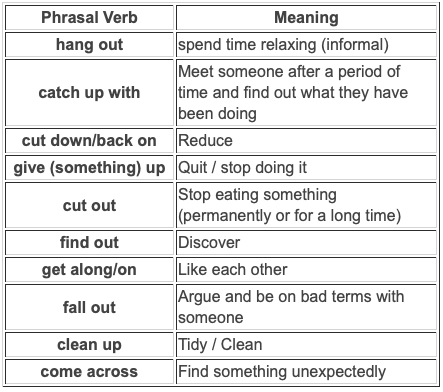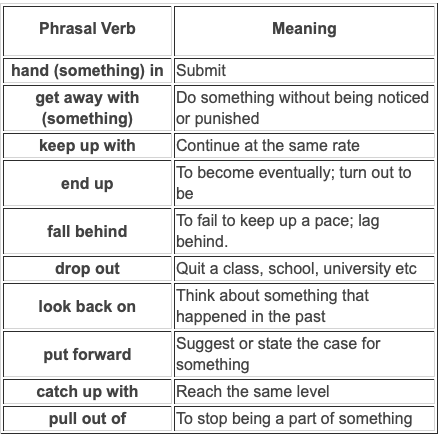- Home
- Types of Verbs
- Phrasal Verb Examples
Phrasal Verb Examples
These phrasal verb examples show you some common types with their meaning. If you are new to English it can be confusing to understand how they are used, so there are also examples of the phrasal verbs in context.
Phrasal Verb Examples Set 1

Phrasal Verb Examples Set 2


More on Verbs:
Types of Verbs used in the English Language
There are various types of verbs and verb forms used in the English language. Examples are state verbs, modal verbs, phrasal verbs, and irregular verbs.
Finite Verbs: Verbs that take a subject and tense
A finite verb is a verb that has a subject and a tense. That is in contrast to a non-finite verbs which does not have a subject and cannot form tenses.
Ditransitive Verbs Explained
Ditransitive verbs are type of transitive verbs that take both a direct and indirect object. They are words such as give, buy, and lend.
Modal Verbs of Permission: May, Can, & Could
The modal verbs of permission May, Can, & Could are used when we want to ask if we can do something.
Modal Verbs of Suggestion and Advice
The modal verbs of suggestion and advice are 'should', 'ought to' and 'had better'. Here we explain the differences.
Modals in English grammar: Explanation and Examples
Modals in English grammar are used alongside another main verb to add further meaning to a sentence. They typically show obligation, possibility or speculation
Stative Verbs: For Opinions, Feelings, and Emotions
Stative verbs are used to reflect states of mind such as opinions, feelings, sense perceptions, and emotions. They are not usually used in the continuous tense.
Modal Verbs of Request
Modal verbs of request are you to ask for something such as permission, help, or favour but you need to get the tone and structure correct.
Past Participles: Definition and Examples
Learn about past participles, their definition and examples, in this English grammar lesson.
'Used To' Quiz: Multiple Choice
Used to quiz testing you on the use of this verb for repeated states and actions in the past. Choose whether the 'd' is needed or not.
Finite Non-Finite Verb Quiz: Multiple Choice
In this finite non-finite verb quiz you are given a list of sentences and you have to decide whether the verb in each is finite or non-finite.
Use of the Bare Infinitive
In this lesson we look at the use of the bare infinitive to form sentences, including example sentences of this verb.
The Meaning of Used To: How and when to use it
'Used to' is not a tense in itself (it's actually a modal verb), we use it to talk about the past instead of the past simple for certain situations.
Modal Verbs of Ability Quiz: Can, Could, Be Able To
In this modal verbs of ability quiz you have to decide if can, could, or be able to will fit on the gap.
Gerund or Infinitive Quiz
In this gerund or infinitive quiz you need to choose whether the gerund, to + infinitive or bare infinitive fits in the gap.
Multi-word Verbs: Understanding Phrasal and Prepositional Verbs
There are three multi-word verbs: prepositional verbs, phrasal verbs, and phrasal-prepositional verbs.
Modals to Express Ability: Can, Could, Be Able To
The modals to express ability are can, could, and be able to. Learn with examples how to place these in sentences.
Transitive and Intransitive Verbs: The Differences
Transitive and intransitive verbs are different in transitive verbs must have a direct object, whereas intransitive verbs do not. In this grammar lesson we will look at the differences between them and study some examples.
Video: Modal Verbs of Ability
In this video modal verbs of ability are fully explained, covering can, can't, could, couldn't, should, shouldn't and be able to.
Modal Verbs for Habits: Will, Would and Used To
The modal verbs for habits are 'will' and 'would', but the semi-modal verb 'used to' can also be used to express habits.
Should You Split Infinitives? The Truth
Should you split infinitives? Learn what they are, why they’re not grammar mistakes, and how to use them clearly and confidently in English.
Copular Verbs or Linking Verbs
To join an adjective or noun complement to a subject we use copular verbs, commonly known as linking verbs. Examples are: be, appear, taste, feel, and get.
Modal Verbs Multiple Choice Quiz
In this modal verbs multiple choice quiz, choose which of the three choices of verbs should go into the gap to make a grammatically correct sentence.
Semi-modal Verbs Explained (aka Marginal Modal Verbs)
In this lesson, semi-modal verbs, also know as marginal modal verbs, are explained. Unlike pure modals, they can act like regular verbs.
What are Participles in English Grammar?
Learn what participles are in English grammar - present and past participles and participle phrases.
New! Comments
Any questions or comments about the grammar discussed on this page?
Post your comment here.

Sign up for free grammar tips, quizzes and lessons, straight into your inbox
| site search by freefind | advanced |
Subscribe to Grammar Wiz:
Grammar eBook
This is an affiliate link
Recent Articles
-
Difference between Abstract and Concrete Nouns
Dec 08, 25 10:17 AM
Discover the difference between abstract and concrete nouns with this clear, practical video lesson. Learn how to identify each type and use them correctly. -
Advice versus Advise Quiz
Dec 07, 25 12:00 PM
This Advice versus Advise Quiz will help you master the difference between the noun “advice” and the verb “advise” -
Compound Adjectives and Hyphens
Nov 06, 25 08:10 AM
Learn how to use compound adjectives and hyphens correctly, when not to, and examples of number-based, superlative, adverb-based, and multi-word compound adjectives.
Important Pages
Search Site
| site search by freefind | advanced |
Copyright © www.grammarwiz.com All rights reserved








